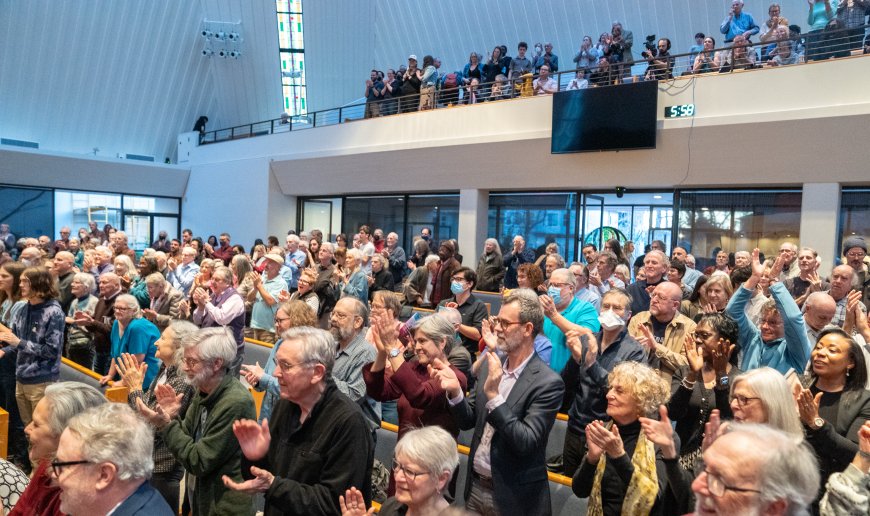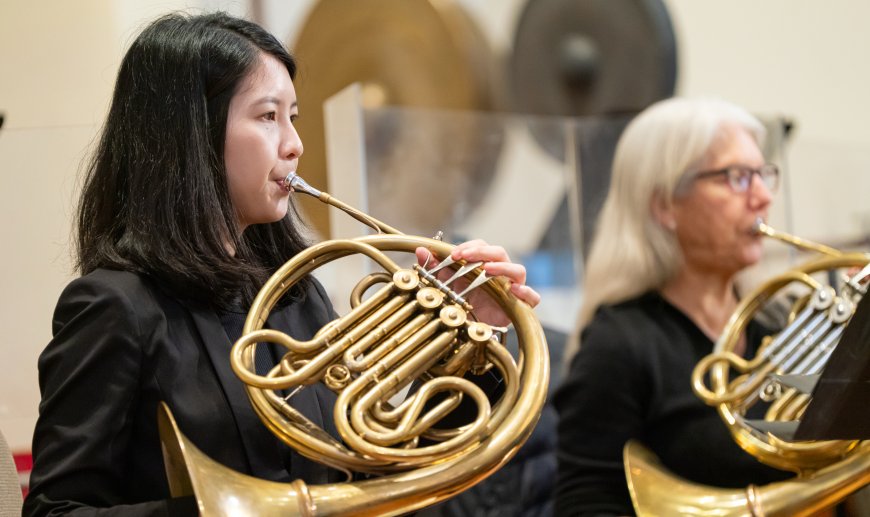
“We would have liked for him to stay,” said Berkeley Symphony Executive Director Marion Atherton about Joseph Young, who conducted his final concert as the orchestra’s music director earlier this month. “But I think this created an opportunity, and we’re taking advantage of it.”
Over coffee, Atherton was discussing the orchestra’s 2025–2026 season, announced on May 20. As expected, the schedule features an attractive squad of guest conductors: Dina Gilbert, Edwin Outwater, Ming Luke, and Carolyn Kuan, in that order.
“We were looking for people who have some sort of local connection, some sort of resonance with Berkeley and the Bay Area,” noted Atherton. “This is important in terms of our reflecting the community and building it, and I think these are very deeply held core values in Berkeley.”
Gilbert was a protegee of and recommended by Kent Nagano, who led the Symphony from 1978 to 2009. Outwater is currently music director of the San Francisco Conservatory of Music. Luke is music director of the Berkeley Community Chorus & Orchestra and concurrently the Symphony’s education director. And two months prior to her engagement in Berkeley, Kuan is slated to conduct the world premiere of Huang Ruo and David Henry Hwang’s The Monkey King at San Francisco Opera.

Although the Symphony’s administration and board of directors sought conductors for 2025–2026 “who we could imagine might be interested in a longer relationship,” Atherton was explicit that the season should not be viewed as a series of auditions. “And I wouldn’t necessarily say that we’re limiting ourselves only to this group,” she added about the ongoing search for Young’s successor.
It was assumed, Atherton said, that the guest conductors “should have a lot of artistic license with the programming” of the season. In keeping with Young’s legacy, “we wanted to balance works from the traditional canon with works that stretch people’s knowledge, push their boundaries, and cultivate curiosity about living composers and new works.”
To these ends, the season’s opening concert on Sept. 14, helmed by Gilbert, includes a piece by Canadian composer Samy Moussa that “hasn’t been performed by the Symphony before and another by Alyssa Weinberg, a New York composer who hasn’t yet been introduced to Berkeley audiences,” said Atherton. The works share the bill with Tchaikovsky and Beethoven.
On Oct. 5, Outwater conducts Gender Envy by Yaz Lancaster, a composer who participated in SFCM’s Emerging Black Composers Project. Haydn’s “Military” Symphony also appears on the program, along with the Chamber Concerto by Samuel Adams, “who is, of course, a local son of Berkeley,” Atherton said.

Another couple of living composers, Missy Mazzoli and Juan Pablo Contreras, figure in the Nov. 16 program. Mazzoli is new to the Symphony, and Contreras’s piece has been co-commissioned to coincide with the Mexican holiday of the Day of the Dead. Dmitri Shostakovich and Richard Strauss are also represented.
The season’s final orchestral concert on Jan. 25, 2026, serves as what Atherton terms “a nice echo of the SF Opera premiere,” with Kuan leading Huang Ruo’s Folk Songs for Orchestra. Also crossing the Bay is SFCM faculty member Marc Teicholz, performing Clarice Assad’s Concerto for Guitar and Chamber Orchestra, sponsored by the Berkeley-based Harris Guitar Foundation. Rounding out the program is Antonín Dvořák’s Symphony No. 8.
The Symphony’s chamber series picks up in 2026, curated by Adams, Contreras, Classical California host Dianne Nicolini, and local organist James Parrish Smith. Also continuing is the orchestra’s Music in the Schools program.
Meanwhile, Atherton aspires to revive the Under Construction collaboration with UC Berkeley’s Music Department and to explore the possibility of a consortium with other city arts organizations. “We have a reasonably solid financial situation,” she said, “but over the next year or two, we need to do some work to build our audiences.”
For more information about the upcoming season, visit Berkeley Symphony’s website.




